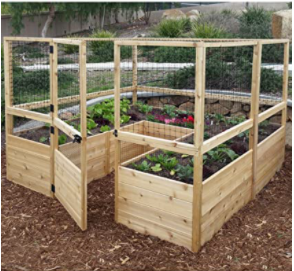Gardening
Help the residents learn how to grow vegetables and herbs to cook with.
We especially need leads who know a bit about gardening. Sessions will be after 3 PM weekdays or can be on weekends. We’ll pair you with a cottage depending on what works in your schedule. Can you join us?
And thank you to all the generous supporters who allowed us to purchase deer-proof garden beds for all 8 cottages (living quarters for 10 to 17 residents)!
If you’d like to take this a step further, you can share the Edible School Yard program which has 2 main components with 4-weekly suggested lessons & activities provided.
- Know, Sow, Grow – hands on growing with gardening-based activities & lessons geared towards teaching the basics of plant parts & processes, emphasizing garden vocabulary & observation.
- Cooking with Curiosity – introduces the youth to cooking skills while building reflection practices so that they can cook confidently on their own terms.
Our curriculum has been condensed and adapted from The Edible Schoolyard Project.
Plant & Seed Donations Welcome – A few ideas are carrots, tomatoes, cucumbers, jalapenos, potatoes, sugar/pie pumpkins, zucchini & other squash, blueberry bushes, and all types of vegetable seed packets.
Email with questions or if you’d like to be a part of this program with a cottage of kids.

The Benefits of Gardening Are Numerous
Successfully taking a tiny seed & helping it to grow & flourish
- Boosts Self Confidence
- Instills a spirit of hope, endurance & patience – virtues needed for both gardening & life
- Encourages relationship building, trust, responsibility, & problem solving skills
- Reduces recidivism rates among participants
- Lowers rates of depression & improves mental health
- Lowers stress levels
- Provides outdoor physical activity – exercise to improve endurance, strength, mobility & flexibility
- Increased emotional intelligence
Studies show prison gardens:
- Save money for criminal justice centers since they provide a healthy source of inexpensive fresh food for better nutrition
- Community gardens foster feelings of community & connection
Vocational Landscape Training
This horticulture program will also give hands-on-skills to residents who can in turn find related jobs upon release.
Here’s a great article with more benefits of prison gardens.